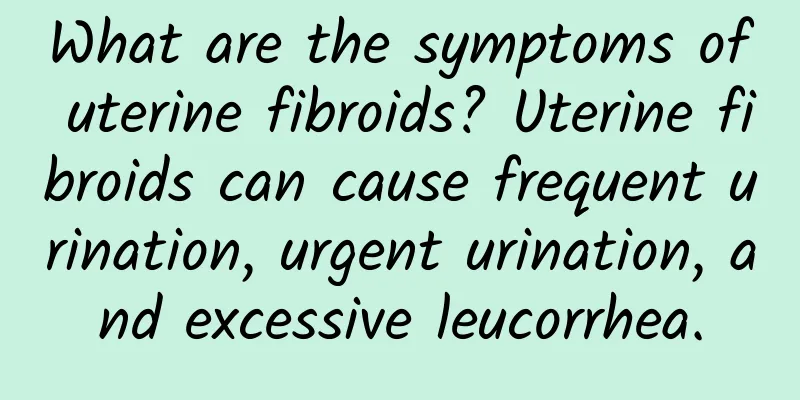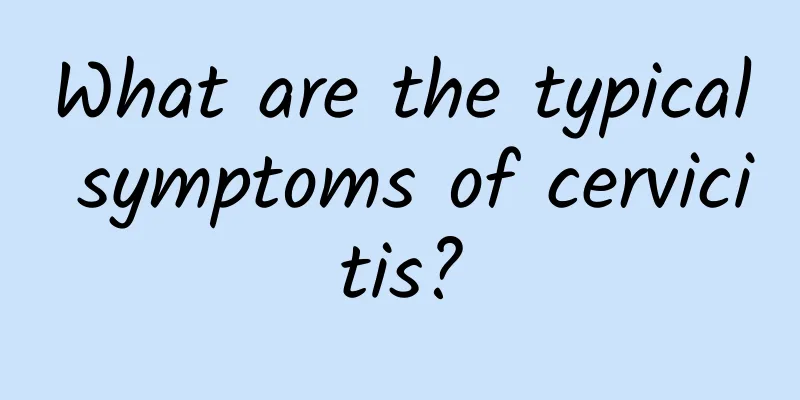What are the symptoms of uterine fibroids? Uterine fibroids can cause frequent urination, urgent urination, and excessive leucorrhea.

|
Uterine fibroids, also known as uterine leiomyoma, are the most common benign tumors of the female genitalia. Most are asymptomatic, with a few showing vaginal bleeding, abdominal tumors and compression symptoms, such as pedicle torsion or other conditions that can cause pain, which is common in multiple uterine fibroids. Most patients have no obvious symptoms and are only occasionally found during pelvic examinations. As a common gynecological disease, uterine fibroids often have different effects on patients, but many uterine fibroids often have many negative effects on the health of patients. Therefore, it is very important for everyone to learn to recognize the symptoms of uterine fibroids in daily life. So, what are the typical characteristics of uterine fibroids? 1. Constipation: Normal bowel movements are normal, but suddenly there is difficulty in defecation and tenesmus. 2. Urgent and frequent urination If there is no disease in the urinary system itself, urgency and frequent urination will occur. Even if it is urination disorder and urine retention, uterine fibroids will compress the bladder. 3. Due to the increase of uterine cavity, vaginal secretion increases, glandular secretion increases, leading to increased leucorrhea. When the surface of submucosal fibroids is accompanied by infection, a large amount of bloody or purulent leucorrhea will appear, and there will be a pungent odor. 4. Anemia: Long-term excessive menstrual bleeding caused by uterine fibroids can lead to secondary anemia. In severe cases, symptoms may include general fatigue, pale complexion, shortness of breath, and palpitations. 5. Menstrual abnormalities include shortened menstrual cycles, about once every 20 days, longer menstrual duration, and increased bleeding volume. 6. When uterine fibroids gradually increase in size and the abdominal mass protrudes into the abdominal cavity, a hard and active mass can be felt in the lower abdomen in the morning when the stomach is empty or the bladder is full. Uterine fibroids are neoplasms that generally do not disappear naturally. It is worth noting that the nature of uterine fibroids can change. The best result is tumor shrinkage, but sometimes infection and necrosis may occur. Some people think that taking some medicine can cure uterine fibroids, which is misleading. Uterine fibroids are difficult to "disappear". Long-term use of so-called "disappearing" medicines can cause liver and kidney damage. |
Recommend
Do you know the cause of chronic cervicitis?
Do you know the causes of chronic cervicitis? Amo...
How to prevent vaginitis from recurring
How can I prevent vaginitis from recurring? Vagin...
What are the causes of cervical erosion? Cervical erosion in women is related to five reasons
Cervical erosion is a common uterine inflammation...
What medicine can stop functional uterine bleeding?
Functional uterine bleeding can be stopped by med...
What is the reason for less menstrual flow?
The decrease in menstrual flow is due to the decl...
What should I pay attention to if I have a miscarriage? What are the symptoms of miscarriage?
Most miscarriages are accidental, and about 70% o...
What are the hazards of cervicitis in women? Women must know the 4 major hazards of cervicitis
If cervicitis is not treated in time, it will cau...
Can a hydatidiform mole be expelled on its own?
A hydatidiform mole cannot be expelled on its own...
Experts introduce the clinical symptoms of uterine fibroids
Uterine fibroids are a common gynecological tumor...
The top 5 domestic rices are released! Taijing No. 9 wins the championship
What kind of rice does your family eat? Although ...
The following are some of the causes of cervical hypertrophy
Cervical hypertrophy is a gynecological disease. ...
Understand the main symptoms of vulvar leukoplakia
Do you know how the symptoms of vulvar leukoplaki...
What are the important factors causing irregular menstruation?
Important factors causing irregular menstruation....
Why can I only see uterine fibroids on one side? I have a uterine fibroid but it is very small. Is this serious?
Why can I only see uterine fibroids on one side? ...
Acute adnexitis is often caused by decreased body resistance.
Generally, acute adnexitis occurs in the fallopia...









